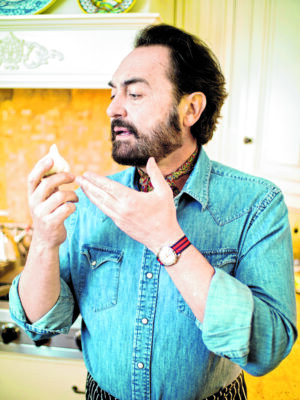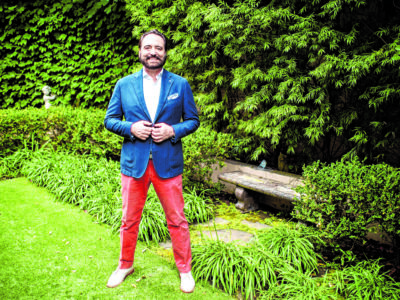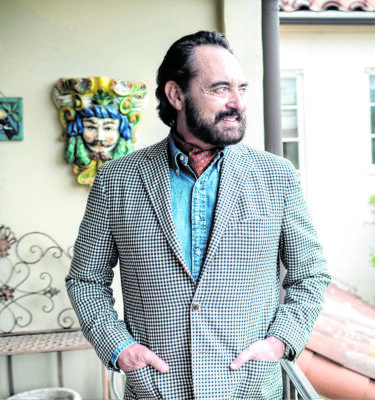The term Renaissance man is one that oftentimes gets overused quite haphazardly. But when that turn of phrase gets applied to Nick Stellino, it’s wholly appropriate. As the son of a mother from Northern Italy and a Sicilian father, the self-described “mixed breed” not only has the pedigree to carry that designation, but more importantly, the same passion, drive, curiosity and intelligence that earned his fellow countryman Leonardo DaVinci that description so many centuries ago.

Nick Stellino has penned 12 cookbooks.
To say Nick Stellino is a man of many deeply held passions is an understatement. To most people. Stellino has been a public television fixture for the past three decades as the host of a series of shows including Nick Stellino Cooking with Friends, Cucina Amore, Nick Stellino’s Family Kitchen and most recently, Nick Stellino: Storyteller in the Kitchen. Not unlike an iceberg that only shows one tenth of its volume above the waterline, Stellino and his accomplishments are far beyond what fans and foodies may view on their screens. A passion for watches and fashion led to his learning how to build his own timepiece and later becoming a spokesman for luxury watchmaker Maurice Lacroix and taking part in an exclusive photo shoot and interview with Astor & Black Custom Clothiers based on his self-designed bespoke fashion style.
It’s a journey driven by an entrepreneurial spirit that led to Stellino coming over to the United States in 1975 at the age of 17 from Palermo, Italy and becoming a successful stockbroker by the late 1980s. A raconteur whose combination of self-deprecation, straightforwardness and gregarious nature not only makes him the quintessential storyteller (and the perfect person to host a show with that descriptor in the title), but a force of nature that draws you into his orbit, even if you’ve just met him. And while he’ll be quick to point out that other immigrant stories are far more interesting than his, the details he provides in these richly woven tales bely that assertion. Particularly when you ask him about his success as a television chef.

(Photos by Dalen Muster)
“Selling is selling and if you sell something, you get to understand what it is you’re selling,” he says. “Most of my work has been done away from the television cameras and people reporting on it. The TV show became a little gift I gave to myself with all the money I made from selling the articulation of events from corporations, speaking engagements and custom-made cooking schools. The greatest job I ever had was banking these packages of my ability as a storyteller and presenting it to a corporation that’s in need of understanding how you get producing your product and putting it on the shelves. All those layers of people in-between that you need to convince that can give you a hand in pushing the cart a little bit faster—that is how I created my fortune, not on television. Actually, the show was a money-loser from the word go.”
Genes Make The Man
Family is at the epicenter of what makes Stellino tick, dating back to the adoration he had for his mother (“…she was not only beautiful, but the most delicate woman I’ve ever seen in my life.”) and his art salesman father, who helped introduce him to his lifelong love of food and cooking while commandeering the grill at a client’s summertime soiree that Stellino and his family were attending (“I wanted to be the guy people look at because he’s the only one who has the magic to make the food taste like that.”)
Stellino’s cooking origin story is worth recounting where we find our then 12-year-old hero more interested in his host’s teenage daughter before his pater familias won over the cooking progeny’s attention.
“My father was invited by one of his best customers to an event he was hosting,” Stellino explains. “My father asked if he could bring the food because he had this great connection to the butcher. He was a salesman all the time—I remember he had this blue, double-breasted suit with a white shirt and a great knitted tie that he had bought in Rome —I was in love with the whole thing. [My father] started laying out the meat. The barbecue was an old-school one made out of cast iron with the charcoal and the wood used to get the fire started. And even though we were up there in the mountains where the temperature was in the seventies, it was still warm. Next thing you know, he starts peeling off the jacket, the vest, the cigarette is still there. He’s got an undershirt on—I think you guys call it a wife beater. I’m looking at him and looking around and see everyone in the finest custom suits—beautiful ladies in jewels with long cigarettes talking—but everyone was looking at my dad. The man looked like [crap] to say the very least. He was schvitzing and I’m thinking, ‘I want to be him.’”
Betting On Himself
Raised on constantly hearing about “…a land on the other side of the sea called America, where anything is possible,” the fiercely independent Stellino made his way across the pond, where he landed a job as an insurance company market research analyst. When he quickly realized that he had a better understanding of the financial assets he was being hawked by the sales reps who were pitching him, Stellino informed his wife Nanci that he was going to offer his services to the head manager at the local Merrill Lynch office. He sailed through the interviews, trained at the World Trade Center and spent the next eight years making his nut, despite admitting to being “…the worst stockbroker you’d ever seen.” What Stellino did have was the passion that drove him, particularly when it came to an idea he’d fallen in love with. It’s a character trait that carried him into the kitchen, when he decided to quit this lucrative chapter of his life after a client lost 30 percent of his net asset value after Stellino was instructed by higher-ups in what he later realized was a rigged transaction. And once again, guidance came from family in the form of an exchange he had with an uncle who was on his deathbed back in Italy.
“My uncle was in so much pain and so full of morphine, that he wasn’t making any sense and had turned into a former ghost of the man he was,” Stellino shares. “At one point, the nurse asks us to leave because we’re tiring him out. Everybody wanted go hug and kiss him and were crying—me too. And then he grabs my hand as I’m leaving, looks at me straight in the eyes and says to me in Italian, ‘Don’t let go of your dreams. Don’t do things that keep you prisoner.’ How did he know that I was so unhappy? I never spoke about it. I hardly spoke about it to my wife or my mom or dad. What did he see and how did he awaken like that? It kind of impacted me in the most—it was devastating in a certain way.”
Rolling The Dice
Stellino returned to the States, evened up his ledger and walked away from a finance job in a year where he made the most money in his career up to that point. It was at this juncture, the epiphany came that he wanted to open a restaurant with money he’d saved, something he’d have to explain to his wife, who was unaware of his radical career pivot.
“This was the kind of decision we always made together,” he explains. “I knew I was in for some problems. I popped in and said that I had a great idea. Because I loved cooking and we were cooking all the time, I said that I was going out to buy a restaurant and was going to go into the restaurant business. She looked at me—and by the way she wasn’t upset. I’m thinking, ‘Man, this broad is awesome.’ She said that was great but maybe wouldn’t it be better to get a job at the restaurant first? Just to see how things work out and I could learn how to run the business.”
And while Stellino didn’t have the background to run a kitchen, he took a job as a dishwasher and wound up apprenticing to become a head chef and going so far as to return to Italy and work without pay in a number of restaurants in his homeland. And while he eventually wound up as the head chef at Santa Monica restaurant Drago and shooting a number of pasta sauce commercials, that same quest for a new and interesting challenge led to his expressing to wife Nanci a desire to have his own television show.
“I looked at my wife and said the money we put aside for a restaurant should instead go towards me going into television,” he recalls. “I wanted my own TV show. From there, it took me two years and 2,365 phone calls—2,354 no’s and one yes.”

Living The Dream
Three-plus decades and 12 cookbooks later, Stellino is at a point in his life where he gets to pursue his whims, one of which is sharing his love and passion for Sicily.
“You can pretty much say I’m retired,” Stellino says. “I reached a point in my life that the first thing I do when I get up in the morning is decide what I’m going to cook today and what is the new thing that I’m going to learn, even if I fail. The only project I’m interested in now is a history of Sicily and the importance of Sicily as an element. It’s so incredibly spread throughout America in the little part of Italian-Americanism that we see in action every day. But I do want to show Sicily for the beauty that it is. I don’t want to do one of these shows were you see me on the forefront of a beautiful view behind me when I go, ‘This is the most beautiful thing you can see. Let me take you down there.’ Before I do a show like that, I’m going to shoot myself in the head.”
If there is anything Stellino is proudest of is how he’s transferred his love of food, culture and storytelling to a devoted public television fan base at a time when culinary shows on the Food Network and HGTV have come to the fore in the past couple of decades.
“When it comes to my teaching people about cooking, it’s about me teaching them about something I love and I want them to learn to love it the way that I love it,” Stellino says. “You not only have to take baby steps, but you also have to be skillful in showing people how you do it, how people can do it themselves and look how easy it is. If you look at any of my cooking shows from the beginning to the end—even my most complicated recipes, including demi-glace and reduction of sauces—by the time you watch it, you’ll feel like you can do that. That is my greatest skill, otherwise, I can tell you there are tons of people who can cook better than me, are better-looking than I am and are far more successful than I am. But that one skill that I just described and the way I described it where you’re not afraid and you come in and feel like an old friend is teaching you. That’s my skill and I don’t need to put it up because what you see is pretty much what you get.”


















